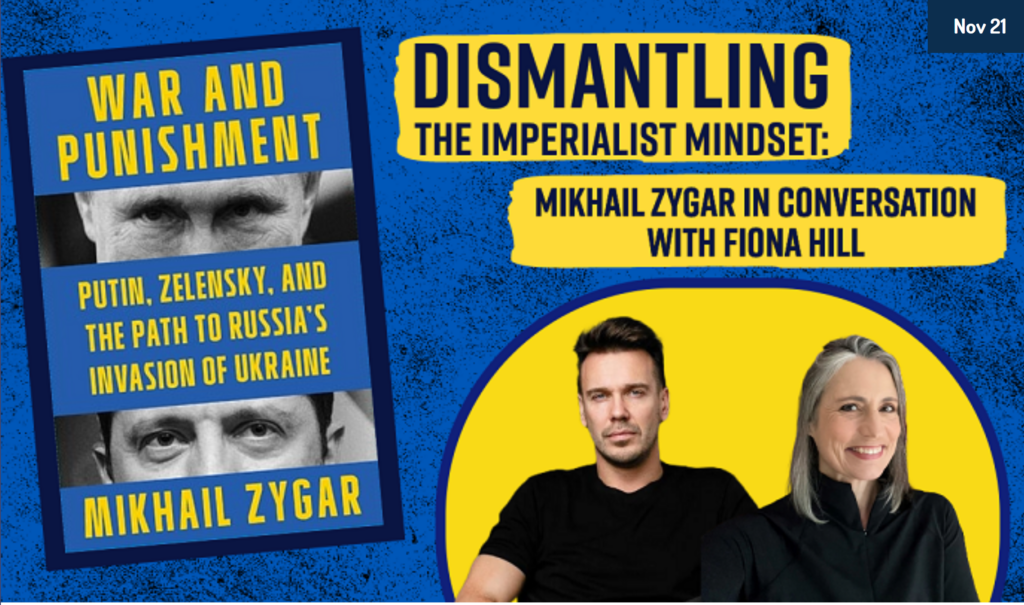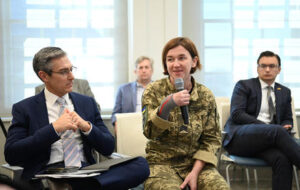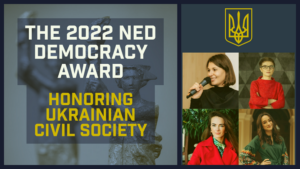
Ukrainian officials and civil society leaders say no effective elections can be held amid a Russian invasion that now occupies about 18 percent of Ukraine’s territory and has uprooted at least 11 million Ukrainians from their homes, USIP reports.
A compromised election, far from providing a clear, national mandate to a president and parliament, would risk “de-legitimizing” the resulting government, according to Olga Aivazovska, board chair of OPORA, a Kyiv-based, non-partisan civic group that promotes government accountability and monitors elections.

National Endowment for Democracy President Damon Wilson listens to Ukrainian democracy activist and army Sergeant Andriana Susak-Rekhta at USIP, October 26. Credit: USIP
OPORA circulated a letter among civil society organizations declaring that “elections and full-scale war are incompatible;” any attempt to hold national elections amid Russia’s invasion “is extremely dangerous and will lead to the loss of legitimacy of both the process and the elected bodies, and with a high probability of significant destabilization of the state.”
“In this situation, can we have the elections?” Ukraine’s ambassador in Washington, Oksana Markarova, asked in a discussion last week at USIP. “Well, definitely not, if you believe in free and fair elections.” She compared Ukraine’s situation with that of Britain during World War II, in which the British parliament voted annually to postpone overdue 1940 elections until after the war’s end.
Both Ukraine and Israel are imperfect democracies which face foes with explicitly genocidal intentions, use terrorism and commit crimes against humanity. Put simply, if Russia wins, Ukrainians disappear. If Hamas wins, Israelis disappear, analysts Alexander Motyl and Dennis Soltys write for Haaretz.
 In his new book, War and Punishment, Russian journalist and historian Mikhail Zygar interrogates the Kremlin’s current justifications for its brutal war and debunks the historical myths that have supported Russian imperialism over the centuries, the National Endowment for Democracy adds. Through examining 350 years of history, Zygar seeks to dismantle the imperialist mindset that has shaped Russian foreign policy and explain how colonialism and chauvinism continues to shape how many Russians view Ukraine.
In his new book, War and Punishment, Russian journalist and historian Mikhail Zygar interrogates the Kremlin’s current justifications for its brutal war and debunks the historical myths that have supported Russian imperialism over the centuries, the National Endowment for Democracy adds. Through examining 350 years of history, Zygar seeks to dismantle the imperialist mindset that has shaped Russian foreign policy and explain how colonialism and chauvinism continues to shape how many Russians view Ukraine.
Please join a conversation with Mikhail Zygar, Press Freedom Fellow at CUNY’s Journalism Protection Initiative and a columnist for Der Spiegel, and Fiona Hill, senior fellow at the Center on the United States and Europe within the Foreign Policy program at the Brookings Institution, as they discuss why understanding the Kremlin’s motivations toward Ukraine today is crucial for policy-making and planning for the future. With opening remarks from Damon Wilson, president and chief executive officer of the National Endowment for Democracy.
 NOVEMBER 21, 2023. 11:00 AM- 01:00 PM RSVP
NOVEMBER 21, 2023. 11:00 AM- 01:00 PM RSVP
For many observers outside of Ukraine, it could seem that Russia’s war began on 24 February 2022. However, this escalation was preceded by eight years of occupation of Crimea and aggression in eastern Ukraine. Before it escalated its aggression, Russia violated international law and human rights and enjoyed impunity.
The Ukrainian Institute (below) discusses two new books on the war: Gwendolyn Sasse’s Russia’s War against Ukraine and Jakob Hauter’s Russia’s Overlooked Invasion: The causes of the 2014 outbreak of War in Ukraine’s Donbas. In conversation with Ursula Woolley, the authors consider Russian imperialism, the changing perception of the war outside of Ukraine and the consequences of Russia’s aggression for Ukraine and the world.
Hundreds of thousands of Russians have fled their ever-more authoritarian country since the start of Vladimir Putin’s full-scale invasion of Ukraine, joining a global exile community that had already been growing for years, American Purpose adds. They include leaders of the political opposition, civil society and media who have long opposed the Kremlin, are natural allies against Russia’s war in Ukraine, and a key hope for reestablishing any future free and open Russian society.
How are these scholars trying to keep teaching, researching and preserving Russia’s intellectual capital for future generations? Please join the Institute of Current World Affairs, American Purpose and U.S. Institute of Peace on Thursday, November 16 from 10-11 am EST for the third in a series of hybrid panel discussions exploring Russia’s exiled citizens.
Featuring:
- Alexander Abashkin, coordinator of the Scholars Without Borders project, run by the Harvard Davis Center for Russian and Eurasian Studies
- Dmitry Dubrovsky, researcher in the Department of Social Sciences at Charles University in Prague
- Maria Yudkevich, former distinguished professor, vice-rector for research, and head of the Center for Institutional Studies at the Higher School of Economics in Moscow
- Angela Stent, moderator, director emerita of the Center for Eurasian, Russian and East European Studies and professor emerita of Government and Foreign Service at Georgetown University. RSVP
A decade of war: origins of Russian aggression in Ukraine https://t.co/LbJI5i6fK6 via @YouTube
— Democracy Digest (@demdigest) November 6, 2023
Based on numerous exchanges, I am confident that the USG (including White House) is not/not negotiating with Russia over Ukraine’s head. Nor does the USG believe that Putin has any interest at this point in good faith negotiations. https://t.co/84aV2egjis
— Daniel Fried (@AmbDanFried) November 5, 2023







